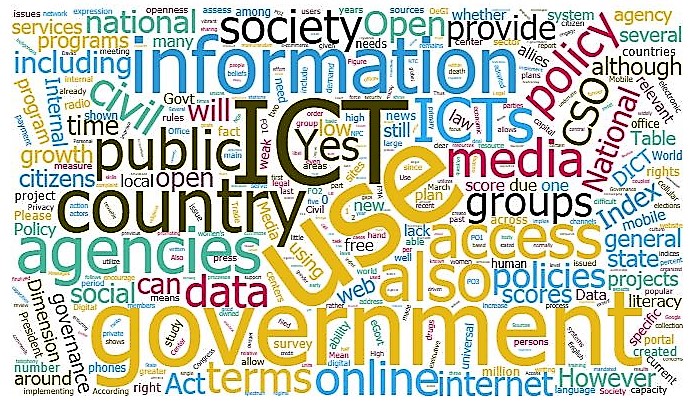The Notion of Open eGovernance. eGovernance can be defined as a series of activities composed of coordinating, arbitrating, networking and regulating with and of ICTs, not only the state, but also non-state actors, including business, civil society and communities. This goes beyond the traditional definition of “eGovernment”, and refers essentially the use of ICTs (now including social media) to also enhance participation of different actors (including media, NGOs/POs, academe, and others) in decision-making. ICT tools are not seen only as delivery mechanisms for public goods, but also a means of information sharing, citizen/public engagement, and even policy development/rulemaking.
Integral in understanding the concept of eGovernance is the term ‘openness’. Though not a new concept, ‘openness’ is now increasingly emerging as a political value by which states—as well as non-state actors–seek to extend traditional notions of democracy and visions of development. It signifies not only the respect of basic human rights (i.e., to access information and free expression), but also leverages the benefits of new social technologies and innovative ICT applications to deepen democracy. This includes strengthening the democratic environment—e.g., the education system, diverse and independent media, and socio-cultural freedoms—all comprising ‘communication rights’; and also the range of policy/regulatory alternatives that are available for governments to adopt: from the protection and extension of the public domain and “fair use”; to encouraging open access models in publishing and academia; to alternative licensing systems for content (e.g., Creative Commons/GPL); and state utilization of social media.
Lack of Indicators for ‘Openness’. Despite the preponderance of eGovernment indicators around the world, these systems are inadequate and those in place are not able to measure the different aspects of Open eGovernance sufficiently. Different well-known indicator systems focus more on infrastructure and actual usage of ICTs only by government and business. There is a notable lack of measuring the legal and policy environment in terms of assessing the over-all political, economic and socio-cultural ecosystem that allow for the strategic use of these ICTs. Aditionally, there are no existing indicator systems that measures the value of civil society utilization of ICTs, or measures “open” legal/policy/regulatory frameworks that enhance emerging concepts of governance—including “open spectrum”, “open content”, “open data”—and how it integrates with democratic eGovernance.
An Open eGovernance Index. The challenge therefore is to document and codify traditional and emergent notions of “open governance”, and further extend the notion of “openness” within public administrations; in so doing, there is value in providing governments (and civil societies) with basic standards in which to assess efforts. Information (and knowledge) has indeed been referred to as the currency of democracy. Promoting the open sharing of this information and knowledge has been framed as a public good, and ICTs and the internet have been proclaimed as positive social forces for democracy and development.
This project seeks to build on an earlier effort by the proponent with partners in several countries in and beyond Asia, to develop and popularize an “Open eGovernance Index”, which hopes to be a normative tool for assessing how countries are utilizing “openness” in network societies to enhance public service, citizen participation/engagement, and addressing communication rights. An initial framework and assessment tool has been developed with funding support from IDRC (ended 2012), and a pilot test was conducted in four Asian countries. We seek to continue this process to do additional research work, taking into consideration developments in the field over the past two years, and to do a second run of pilot testing with more countries involved.#
![]()
